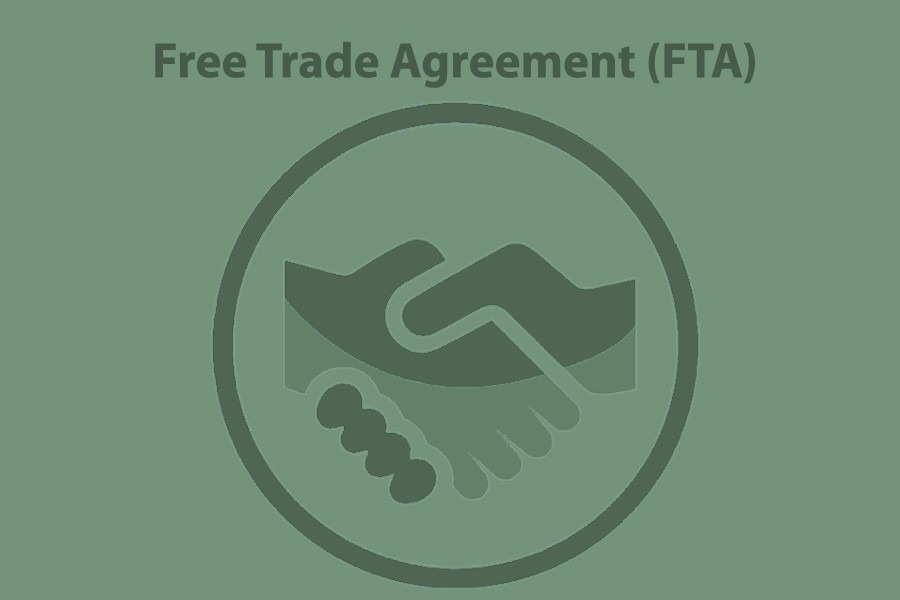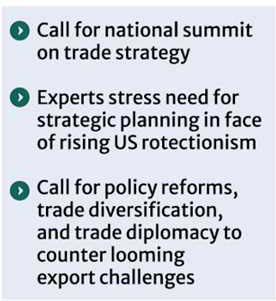
Published :
Updated :

Experts at a webinar Sunday warned that Bangladesh was at risk of losing its trade competitiveness unless it urgently pursues Free Trade Agreements (FTAs) in response to shifting global tariff policies.
Organised by the Forum for Bangladesh Studies (FBS), the event highlighted the growing threat of US protectionism and called for immediate strategic planning to safeguard the country's export future.
FBS hosted the webinar titled "Tariff Crisis and Trade War: What Should Be Our Strategy?" to examine Bangladesh's position in the face of rising global protectionism and the shifting dynamics of international trade.
Dr Niaz Asadullah, Head of Southeast Asia, Global Labour Organisation (GLO), moderated while the keynote address was delivered by Jyoti Rahman, an economist and international relations expert at Sydney Analysis.
The keynote emphasised that the current US tariff policies were weakening the foundation of multilateral trade systems.
Mr Rahman said, "As we look ahead, the path forward seems uncertain."

The global economic recovery continues to face headwinds, and they must prepare for the possibility that this sluggish pace could persist into next year.
If the global recovery is prolonged, Bangladesh will need to rely more heavily on internal resilience.
This means prioritising domestic political stability and enacting deep structural reforms to boost investor confidence and sustain growth from within.
Relying on only external assistance might not be a viable option.
The onus is now on the policymakers and society to take proactive, strategic steps, the key note added.
"Waiting for outside help or a sudden turnaround is no longer realistic. The future depends on what we do now," said the keynote.
Dr Fahmida Khatun, Executive Director of the Centre for Policy Dialogue (CPD), also echoed these concerns.
She said that countries had long relied on their respective advantages-be it natural resources, cheap labour, or technological advancement-as the basis for international trade.
While tariffs may provide temporary benefits to countries like the US, she cautioned that they might ultimately harm global economic stability and equity. Dr Khatun pointed out that Bangladesh successfully capitalised on market opportunities in the 1980s through strategic use of bonded warehouses, back-to-back letters of credit, and government support for labour-intensive industries.
However, these advantages were not one-sided; importing nations also gained through access to affordable products, thus strengthening their own markets.
Addressing the current crisis, she noted that Bangladesh's Ready-Made Garment (RMG) sector so far enjoyed a 15 per cent tariff rate, but this could soon rise to 37, severely affecting export competitiveness.
"Everyone will be a loser in this scenario---consumers, workers, and the overall economy," she said, adding that such a move would undermine employment and deepen poverty in countries like Bangladesh.
She stressed the urgency of strategic planning during the remaining 90 days of this critical phase, urging policymakers to focus on a few key products and sectors to build resilience.
Dr Khatun said that Bangladesh's current tax system, heavily reliant on indirect taxation like VAT, lacks progressive taxation reforms.
She called for comprehensive changes in tax policy to encourage investment, which is essential for boosting trade.
Other crucial areas, such as infrastructure, production cost management, human resources, and bureaucratic efficiency, also need immediate attention, she said.
Mohammad Hatem, president of Bangladesh Knitwear Manufacturers and Exporters' Association (BKMEA), said that while the government made some attempts to mitigate the impact of tariffs, much more remained to be done.
He warned that the US might offer zero tariffs on products with raw material components, which would require Bangladesh to shift its export strategy.
Hatem also criticised the inclusion of several "illogical" compliance demands that have led to factory closures, arguing that such policies hinder rather than help the sector's development.
Russia, he pointed out, represents a major untapped market for Bangladesh, but significant tariff and non-tariff barriers prevent market entry.
Bangladesh could follow countries like Vietnam, which has secured multiple FTAs and thus positioned itself advantageously for post-LDC graduation.
"We are falling behind due to a lack of bilateral and plurilateral agreements," Hatem said, urging policymakers to seriously consider an FTA with the US and other key trading partners.
Zia Hassan, Development and Economic Researcher, Project Researcher, German Federal Ministry of Education and Research, focused on the importance of developing the man-made fiber (MMF) sector in light of the opportunity created by US tariffs on Chinese RMG products.
However, seizing this opportunity depends entirely on Bangladesh's ability to make itself truly competitive.
"We must evaluate whether our political and legal systems are ready to support such a transformation," he said, referring to the need for institutional reforms and reliable law enforcement.
The speakers also said that there is an urgent need for bringing diversification in both product base and export markets.
While African countries remain overly dependent on mineral exports, Bangladesh's heavy reliance on RMG poses similar risks, said CPD executive director.
Hatem said markets like Japan, South Korea, and China offer tremendous potential, but only if Bangladesh pursues FTAs with them.
There were also suggestions that figures like Dr Muhammad Yunus, who holds honorary citizenship in several countries, could be made a face to enhance Bangladesh's soft power and trade diplomacy.
The issue of remittance was also discussed.
In a possible global recession, migrant workers might hold back money instead of sending remittances home, said speakers.
Hence, it is crucial to ensure that the banking sector remains stable and consumer-friendly during this crucial period, said both experts and traders. While wrapping up the session, Jyoti Rahman urged the government to convene a 'national stakeholder summit' to discuss long-term trade strategies.
He stressed that such dialogues must continue irrespective of election outcomes, as these challenges go beyond political cycles.
Throughout the discussion, participants underscored that the Forum For Bangladesh Studies, even during the fascist Hasina regime, remained vocal on all critical economic and governance issues.
The forum reiterated its commitment to taking proactive steps to protect national interest and shape a sustainable trade future for Bangladesh.
tonmoy.wardad@gmail.com


 For all latest news, follow The Financial Express Google News channel.
For all latest news, follow The Financial Express Google News channel.